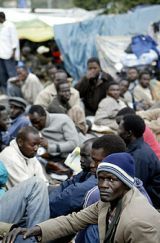Little hope on the horizon for Sudanese refugees in Egypt
Dec 26, 2006 (CAIRO) — Sudanese refugee community leaders are claiming that their living conditions in the Egyptian capital are worse than ever, one year after scores of their members were killed by Egyptian troops.
 The precise number of Sudanese refugees living in Egypt is not known, however observers put the number between one and three million. Many have been living in limbo, waiting for the United Nations High Commissioner for Refugees’ (UNHCR) Cairo office to process their refugee status.
The precise number of Sudanese refugees living in Egypt is not known, however observers put the number between one and three million. Many have been living in limbo, waiting for the United Nations High Commissioner for Refugees’ (UNHCR) Cairo office to process their refugee status.
The situation for the refugees worsened on the night of 29 December 2005, when 27 refugees and asylum seekers were killed in Mustafa Mahmoud Park in Cairo. Another protestor later died, and another reportedly committed suicide because of the trauma.
The attack came after the troops were ordered to forcibly end the refugees’ four-month protest. The protesters had been carrying out a sit-in in anger at the suspension of UNHCR’s Refugee Status Determination process. The process had been suspended as a result of the 2004 peace settlement in Sudan.
According to a report on the Mustafa Mahmoud killings, produced by the American University in Cairo in June 2006, migrants from Sudan – regardless of their official status – face a pattern of unemployment, insecure housing, low access to health and educational services, and widespread racial abuse.
The testimonies of the refugees confirm these findings.
Nazar Hamad Soliman, 29, a leader of the Refugee Voice group that played a major role in the 2005 sit-in, believes the incident one year ago has made things worse for his community.
“After the demonstrations, Sudanese people just got fired from their jobs. Landlords came and put up the rent. There is more racism against us on the street,” he said.
“Because it was reported [in the local media] that the Sudanese in the park were drinking and having sex, things since then have become much worse. The Egyptian people are saying even more, ‘you come to our country, you are a burden to us’,” said Salah Eddin Mohammed, 32, a registered asylum seeker from Darfur, in western Sudan.
Fate lies in the cards
Although many refugees say that nothing has changed since 2005, UNHCR says it is getting through the paperwork, helping some refugees to be repatriated, and sending some for resettlement in a third county.
In 2006, UNHCR reported a total of 12,402 registered asylum seekers and official refugees. However, the agency was unable to confirm to IRIN how many of these individuals had been given a ‘blue card’ (denoting official refugee status).
Asylum seekers awaiting official status – or ‘yellow card’ – face a wait of six months to over a year.
The situation for those holding a blue card is slightly better as they are able to apply for a work permit. However, because of lack of information about their rights and the bureaucratic hurdles, few ever do. Yellow cardholders and unregistered migrants have few, if any, rights at all.
The issue of resettlement was a key point in the 2005 crisis, with many parties believing that the refugees had unreasonable expectations.
Despite last year’s killings and the difficulties the Sudanese community say they face in Egypt, UNHCR still considers the country a valid place of asylum, with resettlement in a third country being only for extreme cases.
“Egypt is considered as giving protection to refugees. There is no refoulement (forced repatriation) here,” said Abeer Etefa, a spokesperson for the Cairo UNHCR office.
The Egyptian government agrees.
“The page has been turned on this issue. Nobody is speaking about this issue anymore,” said Dr Alaa Hadidy, a spokesperson for the Minister for Foreign Affairs.
Consequently, repatriation to Sudan remains the only easily available option for the Sudanese in Cairo. This year, over 700 have taken UNHCR assistance, and returned.
This is not an option, however, for refugees from Darfur, from where people are still arriving at a rate of several hundred a month.
Salah, from Darfur, fears a return to Sudan. “There is war in Darfur, there’s still fighting in the south, despite the settlement, and political oppression in the north. I have nowhere to go,” he said.
(IRIN)
